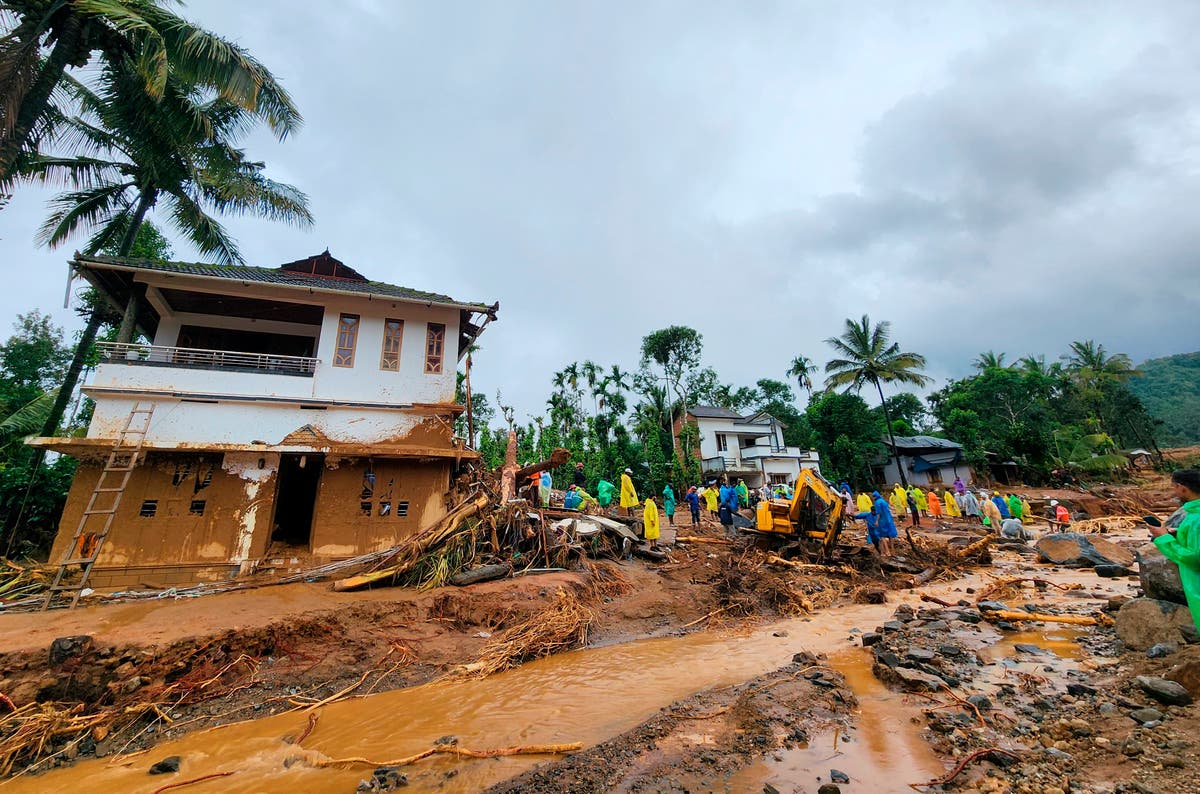The death toll rose to 166 a little over 24 hours after deadly landslides tore through Wayanad in the southern Indian state of Kerala, as rescuers raced against time to reach people trapped under debris.
At least 195 people were injured and many were feared trapped under mud and debris with over a thousand people rescued so far.
More than a dozen bodies were found overnight, a police officer only identified as Aijaz, told the Associated Press.
The landslides struck hilly areas of Wayanad early Tuesday morning, flattening houses, uprooting trees and destroying bridges.
Survivors described being jolted awake by deafening sounds of nearby houses collapsing.
“We thought the entire mountain is going to fall on us. We were fighting death that time,” a villager identified only as Jayesh told India Today.
Nine members of Jayesh’s family were missing as more than 300 rescuers worked to find people stuck under mud and debris, but their efforts were hampered by blocked roads, unstable terrain and incessant rainfall.
The Indian Meteorological Department said Wayanad had received about 28cm of rain in the 24 hours before the landslides.
Recalling the moment the first landslide hit, a resident named Stephen said there was “a jerking like when a helicopter is about to land”.
“My neighbours, a husband and wife, were lying dead holding each other’s hands. We had to separate them and take out their bodies. I rescued a 5-year-old girl. Her mother called out my name, asking for help. I tried my best, but I couldn’t lift her alone,” he told India Today.
Several affected areas such as Meppadi, Mundakkai and Chooralmala remained mostly inaccessible as roads had been washed away, Kerala chief minister Pinarayi Vijayan said.
“Efforts to locate missing persons continue with all available resources,” he said.
A series of videos from the affected areas on Tuesday showed relief workers navigating through debris and uprooted trees, while muddy water flowed through the remains of destroyed homes.
“We are quite sure there are multiple bodies here,” Hamsa TA, a rescue worker told Reuters, pointing to debris near where a bridge was washed away. “There were many houses here, people living inside have been missing.”
MR Ajith Kumar, a senior state police officer, said the landslides started on the upper slopes of the hills and cascaded down into the valley below.
“Focus right now is to search the entire uphill area for stranded people and recover as many bodies as possible,” he told the news agency.
The state government mobilised helicopters to help with rescue work and the army was called in to build a temporary bridge after landslides destroyed one that linked the affected area to the main town.
Scientific assessments show the climate crisis, fuelled by burning coal, oil and gas, is making rainfall more erratic, with higher amounts of rain falling in a short period. The last 13 months have been the hottest on record for the planet, with Sunday recorded as the hottest day ever.
Human activities, like construction in eco-sensitive regions, are making many hilly areas prone to landslides.
“Monsoon patterns are increasingly erratic and the quantum of rainfall that we receive in a short spell of time has increased. As a result, we see frequent instances of landslides and floods along the Western Ghats,” Roxy Mathew Koll, a climate scientist at the Indian Institute of Tropical Meteorology in Pune, told the Associated Press.
Mr Koll urged authorities must check on rapid construction activities in areas prone to landslides. “Often landslides and flash floods occur over regions where the impact of both climate change and direct human intervention in terms of land use changes are evident,” he said.

